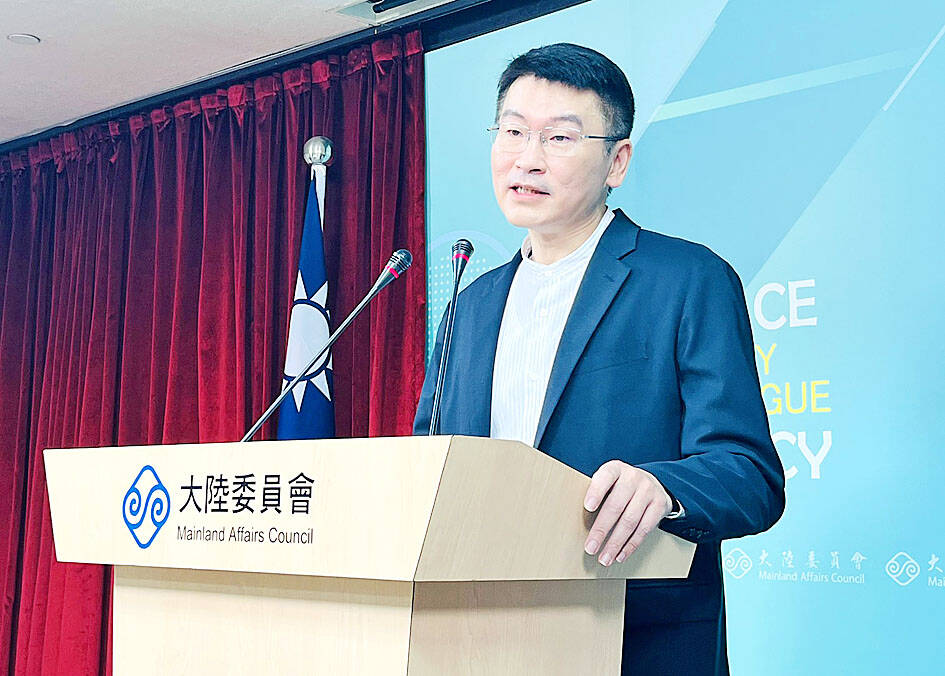The Mainland Affairs Council yesterday said that it has revoked the citizenship of a man named Chang Li-chi (張立齊) for securing a residence permit issued by the Chinese government.
Chang, who teaches at Huaqiao University in China, obtained the permit for his support of Beijing’s “Cross-Strait Integrated Development Policy.”
The council in April provided an interpretation for Article 9 of the Act Governing Relations Between the People of the Taiwan Area and the Mainland Area (臺灣地區與大陸地區人民關係條例), which bans Taiwanese from having household registration in China or holding a passport issued by the Chinese government.

Photo: Chen Yu-fu, Taipei Times
Considering the purpose of the legislation, it should apply to Taiwanese who have Chinese ID cards and residence permits, it said.
“We have ascertained that Chang received the Chinese residence permit for Taiwanese last year, which is in contravention of Article 9-1 of the act. As such, his Taiwanese citizenship has been abolished. Should he wish to visit Taiwan in the future, he must file an application in accordance with the act and have his application approved,” council Deputy Minister Liang Wen-chieh (梁文傑) said.
In other news, the government is monitoring a change in China’s cognitive warfare tactics against Taiwan, which involves attracting people to falsified information with headlines that seemingly recognize Taiwanese sovereignty, Liang said.
In the past, the focus of Chinese cognitive warfare was to vilify the nation and undermine its sovereignty, he said.
“We have noticed the changes in their online content, such as using headlines saying ‘Taiwan revokes Taiwanese singer and actress Ouyang Nana’s (歐陽娜娜) citizenship’ and ‘Trump supports Taiwan’s bid to enter the UN,’” Liang said.
“However, the content is all falsified. Unlike its warrior-style rhetoric in the past, they now use seemingly ‘friendly’ content to attract people’s attention and lead them to view false information. This is an enhanced version of cognitive warfare,” he said, adding that national security agencies are investigating the source of the content.
Ouyang and several other Taiwanese entertainers working in China are under investigation for alleged collusion with China and for having Chinese IDs.

Taipei has once again made it to the top 100 in Oxford Economics’ Global Cities Index 2025 report, moving up five places from last year to 60. The annual index, which was published last month, evaluated 1,000 of the most populated metropolises based on five indices — economics, human capital, quality of life, environment and governance. New York maintained its top spot this year, placing first in the economics index thanks to the strength of its vibrant financial industry and economic stability. Taipei ranked 263rd in economics, 44th in human capital, 15th in quality of life, 284th for environment and 75th in governance,

The Sports Administration yesterday demanded an apology from the national table tennis association for barring 17-year-old Yeh Yi-tian (葉伊恬) from competing in the upcoming World Table Tennis (WTT) United States Smash tournament in Las Vegas this July. The sports agency said in a statement that the Chinese Taipei Table Tennis Association (CTTTA) must explain to the public why it withdrew Yeh from the WTT tournament in Las Vegas. The sports agency said it contacted the association to express its disapproval of the decision-making process after receiving a complaint from Yeh’s coach, Chuang

Control Yuan Secretary-General Lee Chun-yi (李俊俋) tendered his resignation last night, admitting that he had misused a government vehicle, as reported by media. His resignation was immediately accepted by the Control Yuan. In a statement explaining why he had resigned, Lee apologized for using a Control Yuan vehicle to transport his dog to a pet grooming salon on May 20. The issue first came to light late last month, when TVBS News reported that Lee had instructed his driver to take the dog to the salon. The news channel broadcast photos that it said were taken by an unnamed whistle-blower, which purportedly showed the

A former officer in China’s People’s Liberation Army (PLA) who witnessed the aftermath of the 1989 Tiananmen Square massacre has warned that Taiwan could face a similar fate if China attempts to unify the country by force. Li Xiaoming (李曉明), who was deployed to Beijing as a junior officer during the crackdown, said Taiwanese people should study the massacre carefully, because it offers a glimpse of what Beijing is willing to do to suppress dissent. “What happened in Tiananmen Square could happen in Taiwan too,” Li told CNA in a May 22 interview, ahead of the massacre’s 36th anniversary. “If Taiwanese students or